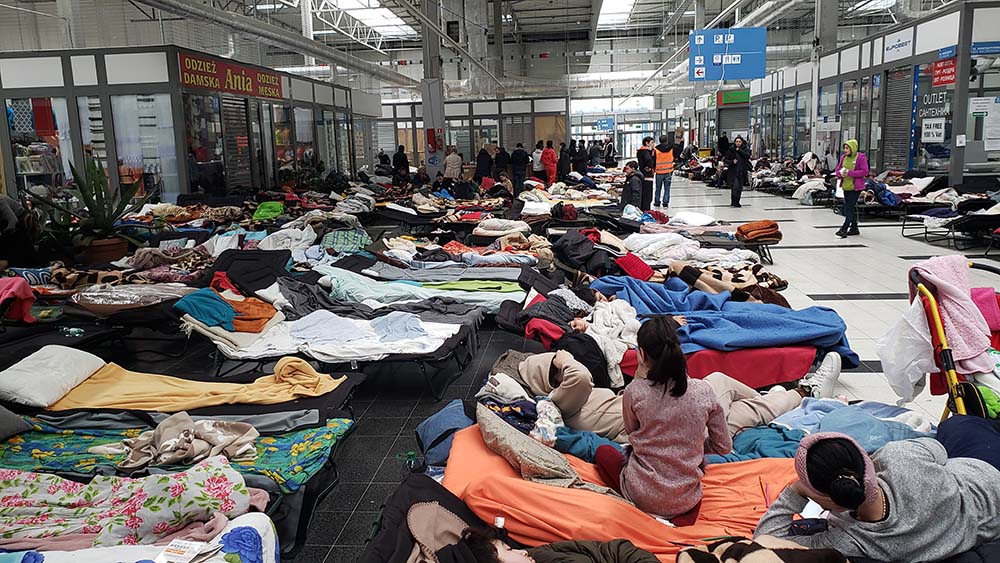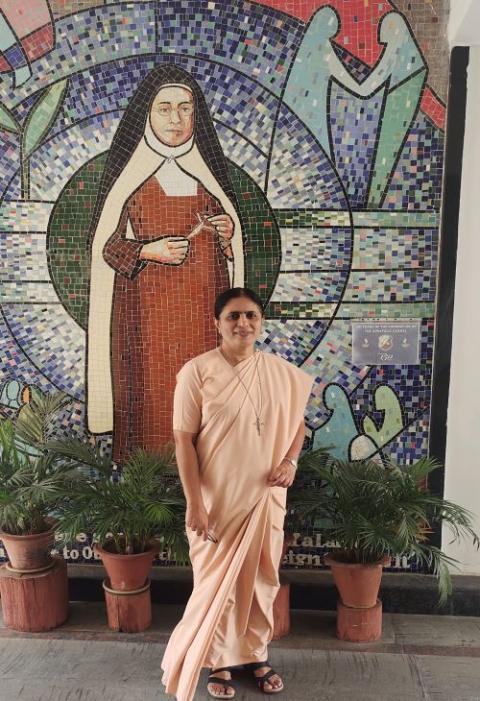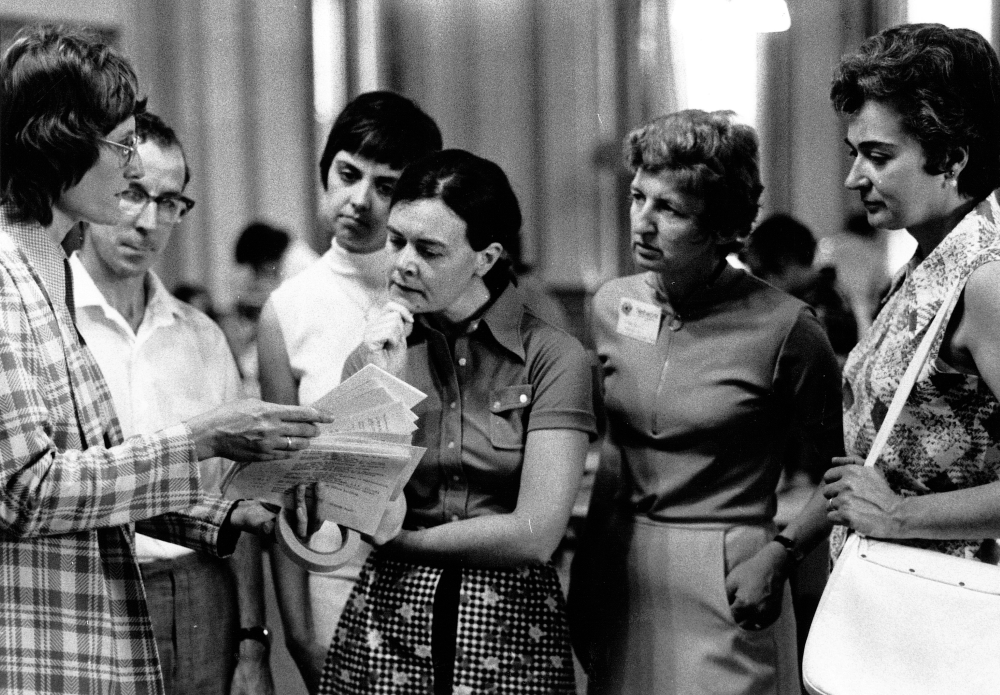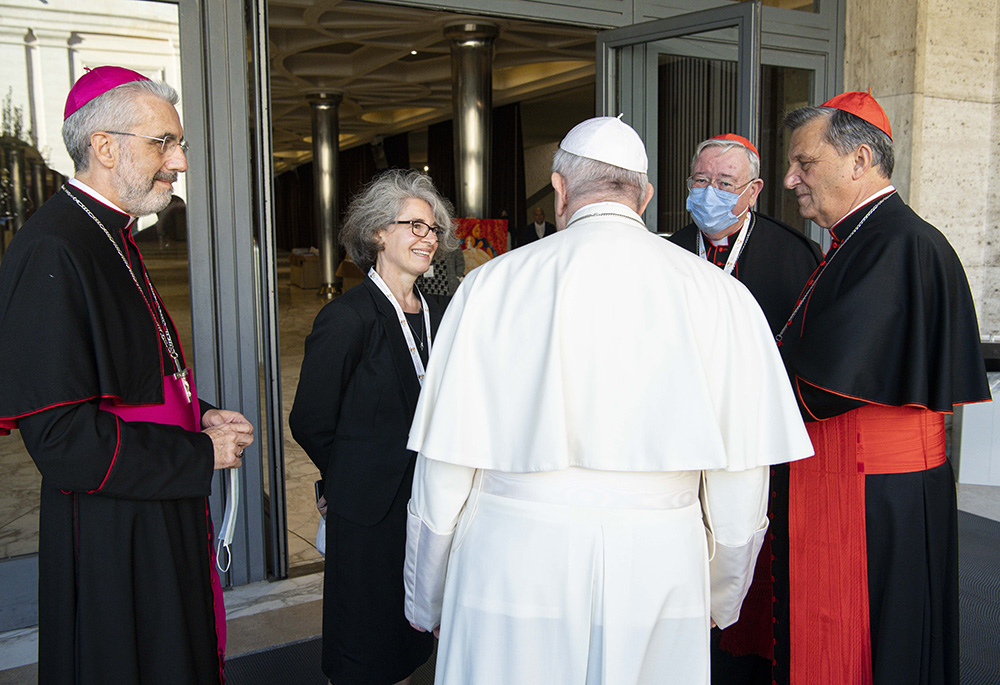
A Mercy sister oversees the distribution of relief goods in San Francisco, Southern Leyte. (Courtesy of the Religious Sisters of Mercy)
And just like that, it's July, and 2022 is halfway finished. Did it go as fast for you as it did for us at Global Sisters Report? If so, you may not have had the chance to read all the stories and columns you may have wanted to that we've published so far this year.
Now, as a midyear pause to catch our individual and collective breaths, we have gathered some of our favorite pieces and topics of the year so far for you to revisit or read for the first time.

Refugees sleep on cots in open spaces at a refugee transit center at a shuttered shopping complex in Korczowa, Poland. (GSR photo/Chris Herlinger)
The continued war in Ukraine
The potential for conflict had been brewing for months, but sisters, like the rest of the world, were stunned when Russia invaded Ukraine on Feb. 24.
"We stand in solidarity with our brothers and sisters in Ukraine, and call upon all people of good will to support Ukraine during this crisis in whatever way they can: prayer, finances, volunteering, anything," one sister said.
Since then, GSR has had reports on the war, including writing about Indian Missionaries of Charity stranded in Ukraine, the increased risk of trafficking that Ukrainian refugees face, and the grants that the International Union of Superiors General is distributing to sisters serving Ukraine refugees. We also carried dispatches by the Sisters of the Order of St. Basil the Great and several columns by sisters about their experiences on pilgrimages in Ukraine, efforts to help refugees or raise money for resources, and prayers for peace.
International correspondent Chris Herlinger flew to Poland not long after the invasion to talk to women religious and refugees. His pieces from that trip, published March 11, March 24 and March 31, are poignant stories of people whose worlds have been upended and now face an uncertain future. All of our coverage, including news stories and columns from sisters, can be found here.

St. Mary by-the-Sea Retreat House in Cape May Point, New Jersey (Courtesy of the Sisters of St. Joseph of Chestnut Hill)
Transforming assets into a legacy
Congregations in the United States are increasingly faced with the question of what to do with the buildings or land they no longer need.
Some communities put their land into preservation trusts to protect them from development. Some sell or convert their buildings into long-term care facilities or downsize to become more efficient. Some sell land and buildings to pay for their members' needs.
Then there are communities like the Our Lady of Victory Missionary Sisters, who are working to transform their assets into agents of change. This story by national correspondent Dan Stockman, which published in mid-January, kicked off an occasional series examining this movement among religious communities in the United States and elsewhere.
Other highlights in this series include a story by Soli Salgado about the Nuns and Nones Land Justice Project, which works with sisters to create legacies that center on racial and ecological healing. Another piece from Stockman focused on a program through the University of Notre Dame that helps congregations discern the best future for their land and buildings.

Ronnie Mattingly, left, and Jude Leake watch Lizzi Seyle try the sledgehammer May 23 as the disaster recovery team works on a home damaged by a Dec. 10 tornado in Mayfield, Kentucky. (GSR photo/Dan Stockman)
Aid for disaster recovery
After a headline-grabbing natural disaster such as a hurricane or an earthquake, international aid organizations can be quick to rush in. But after a time, the media and these organizations move on, often before the communities that need the help have fully recovered.
So far this year, GSR has published two stories about sisters arriving in these communities weeks or even months after a disaster.
First, in February, we brought you the story of sisters in the central and southern Philippines who are repairing buildings and assisting their neighbors several weeks after Typhoon Odette (known internationally as Rai) wreaked havoc on the island nation in December.
Advertisement
"We are doing our best to gradually restore what had been damaged according to the available resources we have," one sister told writer Charity Durano.
Then, last month, we carried a dispatch from Stockman about the Disaster Relief Program run by the Sisters of Charity of Nazareth, Kentucky, and its trip in May to rural Kentucky to help residents recover from a milewide EF4 tornado that tore through the western part of the state in December.
"I'm blessed from God that he brought the sisters to me," one woman said. "I'm so happy."

Sr. Seraphine Agorti, a member of the Sisters of Mary Mother of the Church, administers the COVID-19 vaccine to a beneficiary who accepted to be vaccinated after they convinced him through education. She works together with Sr. Dr. Lucy Hometowu in creating awareness about the COVID-19 vaccines. (Photo by Damian Avevor)
Year three of the pandemic
As the global COVID-19 pandemic continues, so does our coverage.
The world marked the second anniversary of the start of the pandemic in March, and Global Sisters Report published a story from Stockman about how the coronavirus has affected sister-run nursing homes.
"You want to give the best quality of life to the residents, and you can't," one sister said. "We're meeting the basic needs, three squares and all that, but you want the rest of it."
Our reporters also wrote about how sisters debunk misinformation and encourage people to get vaccinated. One story from Doreen Ajiambo, GSR's Africa and Middle East correspondent, told how in six months, the vaccination rate in Uganda went from 5% in October to 31% by the end of May. Officials give credit to the sisters for some of that progress.

Sr. Maria Nirmalini, superior general of the Apostolic Carmel congregation in India, stands in front of a portrait of her community's founder, Mother Veronica of the Passion, at the generalate in Bengaluru. (Thomas Scaria)
"I don't have the exact figures through their awareness campaigns," a medical doctor who works with the World Health Organization in Uganda told GSR, "but I am sure many people have been vaccinated because they trust the religious nuns."
New president of Indian religious conference speaks
In an interview with GSR in the spring, Sr. Maria Nirmalini, the superior general of the Apostolic Carmel congregation and the new president of the Conference of Religious in India, talked about her priorities for the organization and the role of women religious in the church.
"Until now, we have not provided our sisters a platform to at least listen to them, forget about giving them support. We kept blaming patriarchal systems and clergy suppression," she said. "Time has come to empower sisters to become assertive and remain dignified while playing creative roles within the church."
Nirmalini even answered tough questions about clergy sexual abuse.
"The victims often remain silent for fear of taboo and to protect the church's image. Such an attitude only helps the clergy to take the nuns for granted," she said. "Not all priests are bad, but there are a few black sheep. Our silence can lead to more exploitation."

Sr. Patricia Fox, then-superior of the Sisters of Our Lady of Sion in the Philippines, speaks to the media after her April 17, 2018, release from the Bureau of Immigration headquarters in Manila. She now lives in Australia, after being deported by the Philippine government. (CNS/Reuters/Romeo Ranoco)
New focus for a deported sister
In April 2018, Australian Sr. Patricia Fox was arrested at her convent in Quezon City in northeast Manila and held over night by Bureau of Immigration officials. The administration of President Rodrigo Duterte accused her of taking part in illegal political activities — attending protest rallies and visiting prisoners — and of speaking out against the government.
Following her release, Fox, a member of Our Lady of Sion, and her legal team for six months fought the cancellation of her visa and deportation. The legal battle ended abruptly on Oct. 31 at 4 p.m., when immigration officials told Fox that she had been ordered to leave the country by Nov. 3 or be deported.
Fiona Basile interviewed Fox in April in Melbourne, where Fox talked about adjusting to her new life after almost 30 years in the Philippines and being with the people she knew in the joys and struggles of their everyday life.

Delegates at a 1974 Network legislative seminar (Courtesy of Network Lobby for Catholic Social Justice)
Network celebrates its 50th anniversary
Forty-seven sisters gathered at Trinity Washington University in Washington, D.C., in December 1971 to discuss how to make the United States a better place.
Women religious across the nation had embraced the Second Vatican Council's call for renewal and reform a decade earlier by joining the civil rights and women's rights movements as well as anti-war efforts. But they knew change needed to happen at the policy level, so the sisters voted to form a lobbying organization to push for social justice in the nation's laws.
That organization, the Catholic social justice lobby Network, became reality on April 17, 1972. Adrian Dominican Sr. Carol Coston became the founding director and set the pace for the organization.
Today, the nonprofit has more than two dozen staffers and volunteers, 100,000 members and supporters, and national stature. Stockman profiled the organization for its golden jubilee in April.
Social Service Sr. Simone Campbell, who was the lobbying group's executive director until 2021, attributes the organization's longevity to "the mix of being connected to our faith and being connected on the ground," Campbell said. "So often in D.C., advocacy groups can get distanced from the people on the ground, and they can lose that sense of urgency."

Boys who are herders attend a class at the Good Shepherd Night School in Semonkong, Lesotho, while maintaining social distance and wearing masks to protect themselves from COVID-19. The sisters started the school to cater to boys who have been culturally barred from accessing formal education but work as herd boys and shepherds. (GSR photo/Doreen Ajiambo)
Making a difference in Lesotho
Earlier this year, Ajiambo traveled to Lesotho for the first time. The sisters had been asking Doreen to visit them and their ministries and they made sure she had plenty to write about.
Ajiambo's first story focused on the thousands of boys in the high-altitude, landlocked kingdom encircled by South Africa, which is one of the few countries in the world where more girls go to school than boys.
Instead of going to school, thousands of boys in Lesotho are expected to protect and herd cattle, sheep and goats for their families or to find jobs as herdsmen.
The Good Shepherd Night School run by the Good Shepherd Sisters of Quebec in Semonkong offers an education to these boys, including Thabo Kobo, 17, who hopes to become an accountant one day.
"I wanted to continue studying, but my parents couldn't allow me. They only wanted my sisters to go to school," he said. "After getting a job, I decided to go back to school. ... During the day, I am always busy in the fields taking care of my employer's sheep, goats and cattle, but I attend classes at night when the animals are resting."

Pope Francis talks with officials of the Synod of Bishops during a meeting with representatives of bishops' conferences from around the world Oct. 9, 2021, at the Vatican. From left: Bishop Luis Marín de San Martín, undersecretary of the Synod of Bishops; Sr. Nathalie Becquart, undersecretary of the synod; Cardinal Jean-Claude Hollerich of Luxembourg, relator general of the synod; and Maltese Cardinal Mario Grech, secretary-general of the synod. (CNS/Paul Haring)
UISG and women at the Vatican
In the midst of the overlapping troubles facing the globe — the war in Ukraine, the ongoing toll and challenges of the pandemic, the continued threat of climate change, and more — several hundred leaders of women religious congregations gathered in May in Rome to discuss the promise of the upcoming Synod of Bishops on synodality and to witness the reality of the increased role of women at the Vatican.
Christopher White, Vatican correspondent for the National Catholic Reporter, GSR's sister publication, spoke with several of the sisters appointed to Vatican roles by Pope Francis, giving them a permanent seat at the table.
We published this deep dive ahead of the May 2-6 UISG plenary, which GSR also covered from start to finish. In addition to much discussion about the 2023 synod on synodality, the sisters also spent time contemplating vulnerability as a way into the future.
"Alone, we can't make it. We have to walk together," one speaker told the plenary. "Vulnerability is the path of leadership today," and leaders like her have to let "God take the reins."








